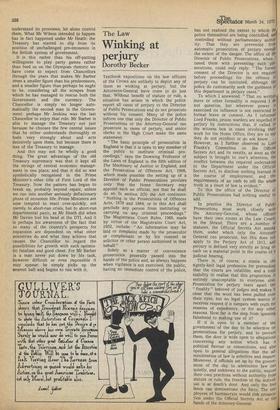The Law
Winking at perjury
Dorothy Becker
Textbook expositions on the law officers of the Crown are unlikely to depict any of them as winking at perjury, but the Attorneys-General have come to do just that. Without benefit of statute or rule, a situation has arisen in which the police report all cases of perjury to the Director of Public Prosecutions and do not prosecute without his consent. Many of the police inform one that only the Director of Public Prosecutions or the Attorney-General can prosecute in cases of perjury, and senior clerks in the High Court make the same statement.
" The basic principle of prosecution in England is that it is open to any member of the public to institute criminal proceedings," says the Downing Professor of the Laws of England in the fifth edition of The Machinery of Justice in England, and the Prosecution of Offences Act, 1908, which made possible the setting up of a Director of Public Prosecutions provides only that the Home Secretary may appoint such an official, not that he shall do so. In section 2(3) the Act continues: "Nothing in the Prosecutions of Offences Acts, 1879 and 1884, or in this Act shall preclude any person from instituting or carrying on any criminal proceedings." The Magistrates Court Rules, 1968, made by virtue of the Magistrates Court Act, 1952, include: "An information may be laid or complaint made by the prosecutor or complainant or by his counsel or solicitor or other person authorised in that behalf."
Solely as a matter of convenience prosecution generally passed into the hands of the police and, as always happens when vigilance is not exercised, the public, having no immediate control of the police, has not realised the extent to which the' police themselves are being controlled, and controlled without parliamentary author' ity. That they are prevented fronl automatic prosecution of perjury reveals the extent of the danger. The office of the Director of Public Prosecutions, when I taxed them with preventing such pro' secutions, could only reply: "The form& consent of the Director is not required before proceedings for the offence of perjury can be instituted, although the police do customarily seek the guidance of this department in perjury cases."
To which I answered: "That no written leave or other formality is required I do not question, but wherever power is exercised its influence is not restricted to formal leave or consent. As I informed Lord Franks, prison warders are impelled to perjury by instructions that, if called to the witness box in cases involving their work for the Home Office, they are to saY they do not recollect or do not know , However, as I further observed to Lord Franks's Committee on the Official Secrets Act and its results, as soon as the subject is brought to one's attention, the conflict between the required undertaking to the Department under the Official Secrets Act, to disclose nothing learned ifl the course of employment, and the requirements of an oath to tell the whole truth in a court of law is evident."
To this the office of the Director of Public Prosecutions had nothing useful to add.
In practice the Director of Public Prosecutions must work closely with the Attorney-General, whose officers have their own rooms at the Law Courts in the Strand. There are a ,number Of statutes, the Official Secrets Act among them, under which only the Attorner General can prosecute, but this does not apply to the Perjury Act of 1911, and perjury is defined very strictly as lying 00 oath on a material point in the course of a judicial hearing.
There is, of course, a mania in the tightly-knit legal profession for pretending that the courts are infallible, and a total inability to realise that this proposition iS entirely unacceptable to everyone else. Prosecution for perjury tears apart the " finality " beloved of judges and makes it clear that the wool has been pulled over their eyes, but no legal system merits or receives respect if it tampers with truth far reasons of expediency, or for any other reasons. How far is the step from ignoring falsehood to making use of it?
If it is open to a member of the government of the day to be selective on prosecutions for perjury, and to prevent them, the door is wide open to allegationS concerning any action which has a political flavour or connections, and also open to general allegations that the ad. ministration of law is selective and impure.
Moreover, if officials set up by the govern' ment of the day to administer law cart quietly, and unknown to the public, impose their own practices without authority frori statute or rule, the freedom of the individual is at death's door. And only the free lance can demonstrate the facts. The erfr ployees of bureaucrats would risk prosecw tion under the Official Secrets Act at the hands of the Attorney-General.


































 Previous page
Previous page